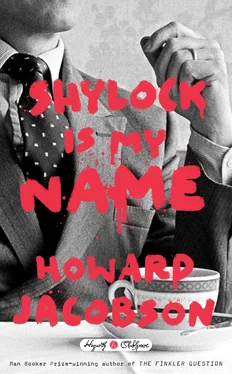To those in his community who thought his devotion morbid he argued that the opposite was the case, that it was only Leah’s company that kept him from falling into that dejection of spirits that was such a common affliction of the times and to which he had more reason than most to be susceptible. This one unaccountably sad, that one inexplicably weary — well, he had his own thoughts about the roots of so much fashionable moping, but for him, and he could speak for no one else, life would have been unbearable had he allowed himself to forget, even for the smallest particle of time, the woman he had loved from the moment he first saw her. You made your vows and you stuck to them. There had been no one else and there would be no one else. If that made him heavy company sometimes, so be it. Who decreed that life was to be one long rowdy masquerade (punctuated with those little pets of melancholy indulged by a crowd who made a religion of their feelings)?
And if this mourning without end put intolerable pressure on his daughter Jessica?
He denied that he was in mourning. Quite the contrary. Spending so much of his time with Leah meant there was no reason to mourn. He was celebrating his marriage, not lamenting it. Where was the sackcloth? Where the ashes? Didn’t he go to the cemetery every morning as spruce as a bridegroom?
But this, as he knew well, was ultimately an evasion. Jessica was, as he told Leah proudly, growing up. Sometimes when he passed her on the stairs he even mistook her for his wife. She had the right to be the giver and the recipient of just such an adoration as her parents had enjoyed, and were still — no doubt unnaturally to her — enjoying. It was her turn.
He would look away when this matter was raised. Even when he raised it with himself he would look away, into another corner of his conscience. Her turn ! What father wanted to think of his daughter enjoying her turn ?
And with whom?
She should, by the logic of their society, have been safe. The daughter of a repugnant Jew! — why, with such blood in her veins the problem should have been to find her suitors, not protect her from them. Who wanted what appertained to Shylock? Yet just as they would take his money, no matter what they thought of him, so they would take his daughter. Did commerce wash the obloquy away? Did desire?
Or was the obloquy the very thing that added savour to what they desired and borrowed or, where they couldn’t borrow, stole?
His daughter was a fine-looking girl. She would assuredly have attracted admirers on her own behalf in a less envious and grasping society, where every man not already married to a rich wife was on the make. He intended no disrespect to her by suspecting the motives of those who wooed her. Quite the opposite: it was because he loved her and saw — often much to his embarrassment — what others saw in her, that he stood guard over her happiness. It was his appreciation of her, as much as anything else, that made him clumsy. A mother would have known better how to do it, but Jessica had no mother. Yes, she deserved to be wooed. But a Jewess was a commodity, the times were acquisitive, and these people were collectors.
Well, the moral confusion was theirs, not his. It went with their religion and they were welcome to stew in it. But his contempt for the prevarications of Christians who professed one thing and did another didn’t help him when it came to working out what to say to Leah. He couldn’t tell her that Jessica had left. That she had become a turncoat, a liar and a thief. Least of all could he tell her what it was that Jessica had stolen.
It was an agony to him — keener than any knife-wound— to be keeping secrets from his wife, whatever the damp was doing to her flesh. It felt like a betrayal of the heart.
And still she doesn’t know.
A mercy, Shylock believes. A mercy she got away when she did.
—
Simon Strulovitch’s daughter had not got away. Not yet. Unless you call college getting away. Otherwise, he was similarly situated. He too fretted about the value placed on her as an exotic, feared the strength of the avidity she inspired, and the effect of the flattery on her. Added to this was his reputation as a wealthy connoisseur, a donor to elitist institutions and, for no reason other than that he’d visited Israel and given artworks to some of its universities, a Zionist — all in all a reputation he was vain enough to see as an inducement beyond Beatrice’s charms. It wasn’t theft he feared — Beatrice did not have the key to his vaults — it was the view of him as a bogeyman on all counts that she was bound to encounter at college, and the added value which that view of him lent her as a prize. She was worth turning, that was what it came to. The histories of terrorism and brigandage, of revolution and sedition, bulged with the apostate daughters of rich men with unacceptable convictions. A girl who would sleep with her father’s enemies was of a succulence beyond description, plunder that exceeded in value even Simon Strulovitch’s rubies and turquoises.
Strulovitch resembled Shylock in another way as well. He, too, was denied the opportunity to raise the matter with the girl’s mother.
The stroke she suffered on Beatrice’s fourteenth birthday felt too horribly symbolic to be any such thing. It was the cruellest misfortune, no more. Fate stuck out his hand and idly struck. It could have been any woman on any day. Hold on to that, Strulovitch told himself. Embrace the arbitrary. Otherwise the blaming would start and of blaming there is no end.
Little by little Kay had recovered words — not actual utterances but the will to move her lips and shape a silent sound, and this was enough to make him feel that someone he knew was still in there. They never approached — in dumbshow or any other way — what had befallen her. She lived in bed now — her own bed — needed to be helped to bathe and eat, and couldn’t always make herself intelligible — beyond that, the pretence went, things were as they’d always been. About Beatrice he was careful to say little, and about his fears for her he said nothing at all. He was reluctant to put any pressures on her. Let Kay decide what subjects she wanted to approach by whatever means were available to her. Beatrice’s presence cheered her, but she seemed to wish to see her only on her own, as though they were separate families, individual spokes of a wheel that had fallen off.
Strulovitch looked past her when he was in her presence. Beyond her, as in a broken mirror, he sometimes saw the wife he’d known but it felt like an infidelity to smile across the room at her. Better, in the presence of a ruined memory to remember nothing oneself. So they sat silently together, he in a chair by her bed, holding her hand, she looking into nothing, the two of them possessed of no before, and certainly no after, in a perfect harmony of unbeing. So unalive to sensation they could have been the first man and woman, waiting to be breathed into, poised for creation to begin.
Strulovitch had never been more thankful for the fortune built on car-parts he had inherited. His relations with his father were repaired. The burial had been only temporary: with his divorce from Ophelia-Jane Smythson came reconciliation, and with his marriage to Kay Kominsky came an inundation of fatherly love strong enough to knock him off his feet. A marriage in instead of a marriage out: it seemed that that was all his father — a man in every other way a heathen — had ever lived for. Keep it in the family. Just that. Fine by Strulovitch. He was re-inherited. And now that Kay was ill he understood how important it was to have money. You needed to be rich. Assuredly he appeared richer than one needed to be — which was why he gave so much away, endowing lectureships, providing music rooms and extending libraries, helping to buy works of art that would otherwise leave the country — yet you needed to be nearly as rich as he was just to live. By which he meant to reside in a house big enough to show art and shelve books, to travel in comfort, to have suits made by Italian tailors, to have a chauffeur, to send one’s daughter to be schooled, and to afford round-the-clock care for one’s wife. He had his own working definition of poverty as well as wealth. Whoever couldn’t afford to make provision for carers and nurses, whether they were necessary now or would be necessary in the future, was dirt poor. To avoid falling into the hands of the state was reason in itself for making money. One worked and earned in order not to die disgracefully. You take my life when you do take the means whereby I live…and the means whereby I hope to die as well.
Читать дальше












